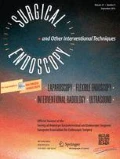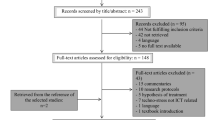Abstract
Background
Little is known about acute stress in surgery although it is recognized to impair human performance in safety–critical industries. This study aimed to establish a direct empirical link between stress and psychomotor performance of novice surgeons.
Methods
Eighteen participants completed this cross-sectional study. Participants carried out laparoscopic tasks on a MIST-VR simulator. Validated dexterity parameters were obtained from MIST-VR (path length, time taken, number of errors). Stress was assessed using the validated Imperial Stress Assessment Tool (ISAT). This captured stress subjectively using the State Trait Anxiety Inventory (STAI) questionnaire and objectively using salivary cortisol and mean and maximum heart rate.
Results
Regarding technical performance, median values obtained were 55.12 s (range = 22.9–99.8) for time taken, 4.83 (range = 3–7) for economy of motion, and 88.0 (range = 35–175) for number of errors made. Subjective stress (STAI) correlated with economy of motion (r = 0.53, p = 0.042) and number of errors (r = 0.51, p = 0.034). Objective stress (mean and maximum heart rate) correlated with time taken (r = 0.62, p = 0.004), economy of motion (r = 0.55, p = 0.048), and number of errors (r = 0.67, p = 0.012).
Conclusion
This is the first study to demonstrate through direct correlation that stress impairs surgical performance on a simulator. Training in managing stress may be required to minimize these deleterious consequences and improve patient care.





Similar content being viewed by others
References
Ramirez AJ, Graham J, Richards MA, Cull A, Gregory WM (1996) Mental health of hospital consultants: the effects of stress and satisfaction at work. Lancet 347(9003):724–728
Sharma A, Sharp DM, Walker LG, Monson JR (2008) Stress and burnout among colorectal surgeons and colorectal nurse specialists working in the National Health Service. Colorectal Dis 10(4):397–406
Lazarus RS (1966) Psychological stress and the coping process. McGraw-Hill, New York
Klein G (1998) Sources of power. How people make decisions. MIT Press, Cambridge, MA
Klein G (1996) The effects of acute stress on decision making. In: Driskell JE, Salas E (eds) Stress and human performance. Lawrence Erlbaum Associates, Mahwah, NJ
Flin R, O’Connor P, Crichton M (2008) Safety at the sharp end: a guide to non-technical skills. Ashgate, Aldershot
Arora S, Sevdalis N, Nestel D, Woloshynowych M, Darzi A, Kneebone R (2010) The impact of stress on surgical performance: a systematic review of the literature. World J Surg (in press). doi:10.1007/s00268-010-0559-4
Arora S, Sevdalis N, Suliman I, Athanasiou T, Kneebone R, Darzi A (2009) What makes a competent surgeon? Experts’ and trainees’ perceptions of the roles of a surgeon. Am J Surg 198(5):726–732
Arora S, Sevdalis N, Nestel D, Tierney T, Woloshynowych M, Kneebone R (2009) Managing intraoperative stress: what do surgeons want from a crisis training program? Am J Surg 197(4):537–543
Sevdalis N, Forrest D, Undre S, Darzi A, Vincent C (2008) Annoyances, disruptions, and interruptions in surgery: the Disruptions in Surgery Index (DiSI). World J Surg 32(8):1643–1650
Undre S, Sevdalis N, Healey AN, Darzi SA, Vincent CA (2006) Teamwork in the operating theatre: cohesion or confusion? J Eval Clin Pract 12(2):182–189
Berguer R, Smith WD, Chung YH (2001) Performing laparoscopic surgery is significantly more stressful for the surgeon than open surgery. Surg Endosc 15(10):1204–1207
Bohm B, Rotting N, Schwenk W, Grebe S, Mansmann U (2001) A prospective randomized trial on heart rate variability of the surgical team during laparoscopic and conventional sigmoid resection. Arch Surg 136(3):305–310
Hassan I, Weyers P, Maschuw K, Dick B, Gerdes B, Rothmund M, Zielke A (2006) Negative stress-coping strategies among novices in surgery correlate with poor virtual laparoscopic performance. Br J Surg 93(12):1554–1559
LeBlanc V, Woodrow SI, Sidhu R, Dubrowski A (2008) Examination stress leads to improvements on fundamental technical skills for surgery. Am J Surg 196(1):114–119
Schuetz M, Gockel I, Beardi J, Hakman P, Dunschede F, Moenk S, Heinrichs W, Junginger T (2008) Three different types of surgeon-specific stress reactions identified by laparoscopic simulation in a virtual scenario. Surg Endosc 22(5):1263–1267
Pluyter JR, Buzink SN, Rutkowski AF, Jakimowicz JJ (2010) Do absorption and realistic distraction influence performance of component task surgical procedure? Surg Endosc 24. doi:10.1007/s00464-009-0689-7
Smith WD, Chung YH, Berguer R (2000) A virtual instrument ergonomics workstation for measuring the mental workload of performing video-endoscopic surgery. Stud Health Technol Inform 70:309–315
Smith WD, Berguer R, Rosser JC Jr (2003) Wireless virtual instrument measurement of surgeons’ physical and mental workloads for robotic versus manual minimally invasive surgery. Stud Health Technol Inform 94:318–324
Arora S, Tierney T, Sevdalis N et al. (2010) The Imperial Stress Assessment Tool (ISAT): a feasible, reliable and valid approach to measuring stress in the operating room. World J Surg
Marteau TM, Bekker H (1992) The development of a six-item short-form of the state scale of the Spielberger State-Trait Anxiety Inventory (STAI). Br J Clin Psychol 31(Pt 3):301–306
Stroud LR, Salovey P, Epel ES (2002) Sex differences in stress responses: social rejection versus achievement success. Biol Psychiatr 52:318–327
Jezova D, Slezak V, Alexandrova M et al (1992) Professional stress in surgeons and artists as assessed by salivary cortisol. Gordon & Breach Science Publishers, Philadelphia, PA
Laudat MH, Cerdas S, Fournier C, Guiban D, Guilhaume B, Luton JP (1988) Salivary cortisol measurement: a practical approach to assess pituitary-adrenal function. J Clin Endocrinol Metab 66:343–348
Moorthy K, Munz Y, Dosis A, Bann S, Darzi A (2003) The effect of stress-inducing conditions on the performance of a laparoscopic task. Surg Endosc 17(9):1481–1484
Dobson D, Neufeld RW (1989) Stress responses and coping propensity among paranoid and nonparanoid, episodic, and remitted schizophrenics. Can J Behav Sci 21(3):280–294
Muller MP, Hansel M, Fichtner A, Hardt F, Weber S, Kirschbaum C, Rüder S, Walcher F, Koch T, Eich C (2009) Excellence in performance and stress reduction during two different full scale simulator training courses: a pilot study. Resuscitation 80(8):919–924
Hardy L, Mullen R, Jones G (1996) Knowledge and conscious control of motor actions under stress. Br J Psychol 87(Pt 4):621–636
Fowler B, Manzey D (2000) Summary of research issues in monitoring of mental and perceptual-motor performance and stress in space. Aviat Space Environ Med 71(9 Suppl):A76–A77
Berguer R, Smith W (2006) An ergonomic comparison of robotic and laparoscopic technique: the influence of surgeon experience and task complexity. J Surg Res 134(1):87–92
Goodell KH, Cao CG, Schwaitzberg SD (2006) Effects of cognitive distraction on performance of laparoscopic surgical tasks. J Laparoendosc Adv Surg Technol 16(2):94–98
Moorthy K, Munz Y, Sarker SK, Darzi A (2003) Objective assessment of technical skills in surgery. BMJ 327(7422):1032–1037
Gaba DM, DeAnda A (1988) A comprehensive anesthesia simulation environment: re-creating the operating room for research and training. Anesthesiology 69(3):387–394
Holzman RS, Cooper JB, Gaba DM, Philip JH, Small SD, Feinstein D (1995) Anesthesia crisis resource management: real-life simulation training in operating room crises. J Clin Anesth 7(8):675–687
Helmreich RL (2000) On error management: lessons from aviation. BMJ 320(7237):781–785
Muller M (2004) Safety lessons taken from the airlines. Br J Surg 91(4):393–394
Yule S, Flin R, Paterson-Brown S, Maran N (2006) Non-technical skills for surgeons in the operating room: a review of the literature. Surgery 139(2):140–149
Acknowledgments
This work was funded by the BUPA Foundation.
Disclosures
Sonal Arora, Nick Sevdalis, Rajesh Aggarwal, Pramudith Sirimanna, Ara Darzi, and Roger Kneebone have no conflicts of interest or financial ties to disclose.
Author information
Authors and Affiliations
Corresponding author
Rights and permissions
About this article
Cite this article
Arora, S., Sevdalis, N., Aggarwal, R. et al. Stress impairs psychomotor performance in novice laparoscopic surgeons. Surg Endosc 24, 2588–2593 (2010). https://doi.org/10.1007/s00464-010-1013-2
Received:
Accepted:
Published:
Issue Date:
DOI: https://doi.org/10.1007/s00464-010-1013-2




